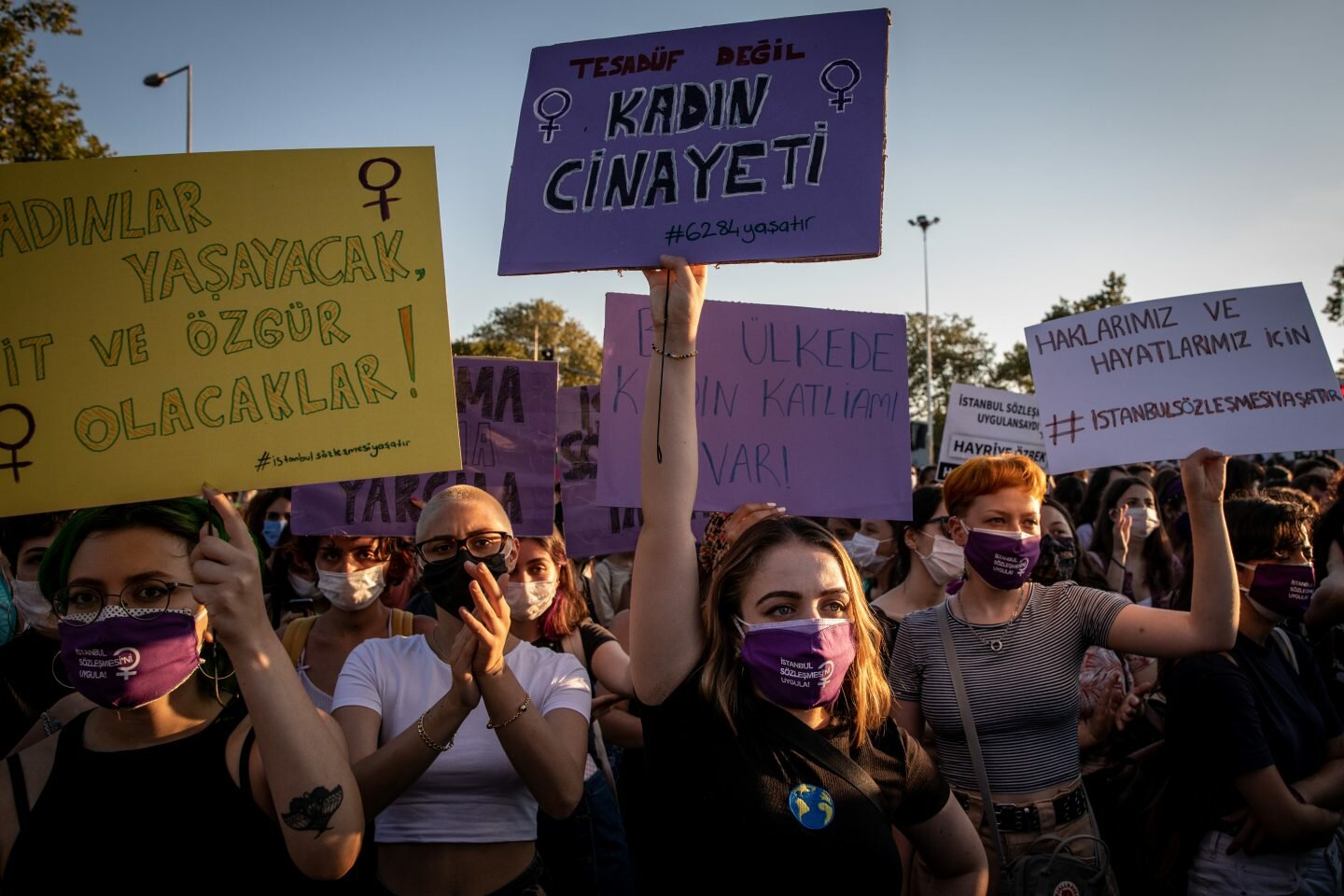Over the past two weeks, black and white selfies shared by women in support of women under the hashtag “challenge accepted” have dominated Instagram feeds.
But the deluge of shots are burying a social media campaign being waged by women in Turkey against a life or death issue: skyrocketing rates of femicide, defined as the murder of women by men because they are women.
The hashtag began to trend in Turkey after police discovered the strangled, partially burned body of 27-year-old student Pinar Gültekin on July 21. Local reports say her ex-boyfriend confessed to killing Ms Gültekin and dumping her body in an oil drum after she spurned his advances.
This was the 204th reported femicide in Turkey to date this year, according to Kadın Cinayetlerini Durduracağız Platformu (“We Will Stop Femicide Platform”), and women immediately took to the streets and social media to protest Turkish President’s Recep Tayyip Erdoğan’s lack of action.
“Violence against women [in Turkey] is political and it is very much supported by government policies,” says lawyer and women’s rights activist İpek Bozkurt, legal counsel for the Platform. “Men who harm women know that they will get away with impunity.”
Turkish women are not the first to leverage black and white images for a cause. In 2016, #challengeaccepted trended under monochrome shots for cancer awareness. But because murdered women in Turkey are depicted in black and white at their funerals and in the country’s news and print media, the images posted by women in Turkey have a chilling implicit message: tomorrow, it might be me and THIS photo you see on the news.
According to “We Will Stop Femicide”, 474 women were killed by men in 2019 – exactly double the number of reported cases in 2013 – although the actual number each year is likely much higher. The Platform’s website, which links to a grisly counter which records the number and names of women killed by year, states that most women were murdered by current and previous romantic partners or family members because they wanted to make their own choices regarding their appearance, work and marriage.
Ms Bozkurt, who is also partner in Bozkurt Çobanoğlu Law Firm, says that Muslim and secular women are equally impacted and the uptick in femicides over time is partly due to killings becoming more common, and partly because more are being reported.
“All these families feel like if they go to the government, their cases are going to be hidden, so they’re saying ‘I’ll make my case known and public so my daughter’s name is not going to be forgotten’,” she explains.
While there are laws in place that protect women in Turkey, they’re not adequately enforced by police or social policy. Ms Bozkurt says that gender bias and their personal perspectives of gender influences how judges and prosecutors proceed with cases, despite the fact that the Istanbul Convention, a 2011 Council of Europe resolution which provides protections for women against gender-based and domestic violence, explicitly describes how the law should be upheld.
A New York Times Opinion piece by Istanbul-based lawyer and journalist Beril Eski earlier this year cites a report by gender experts for the Council of Europe which states that of the 55,757 women who applied for state protection after facing domestic violence in 2016, only 9,429 of those women were provided shelter. It goes on to say that while reports from women seeking protection for domestic violence should be handled within 24 hours without evidence, and restraining orders issued, without the proper support “these are mere pieces of paper, often found in the bags of women murdered in Turkey.”
Ms Eski adds that men who appear outwardly respectable and dress for their court appearance in a suit and tie are so frequently dealt a light punishment that there’s a term for it: “tie reduction”. Ms Bozkurt says that while the perceived good standing of any perpetrator during their trial is grounds for sentence reduction, it’s disproportionately applied to male defendants.
“We have had cases where a woman had to kill their husband because they have been trafficked and tortured. She doesn’t get any of those reductions.”
Although Turkey led Europe in ratifying the Istanbul Convention, which was brought into force in 2014 and signed by the EU in 2017, the country’s current leadership is currently considering pulling out.
Common points regularly aired by Turkish politicians: that women should dedicate themselves to rearing children instead of pursuing a career, that abortion is tantamount to murder, and women should bear at least three children.
“The [men who kill women] find a motivation in the language of the politicians, the president and the minister for family. It’s giving all these men reasonable ground to harm someone,” says Bozkurt.
Now, posts by Turkish women calling on other other and the world under Turkish hashtags such as #istanbulsozlesmesiyasatir (“Istanbul convention saves lives”), #kadinhaklari (“women’s rights”) and #kadinasiddetehayir (“say no to violence against women”), as well as #challengeaccepted and #womensupportingwomen, are being buried under a landslide of images posted under the same English hashtags.
On July 29, the Turkish Government passed legislation that allows it to demand social media platforms with more than one million daily users to establish an office and store user data in Turkey, and to remove content it deems offensive. These powers will likely come into force on October 1.
Ms Bozkurt says that while street and social media protests have given policy makers pause in diminishing protections for women, these new laws may stifle activists’ voices.
Moving forward, the real “challenge” for Turkish women is to ensure they keep being heard, and for women and allies around the world to support them and push for progress via social media.
“In all cases around women’s rights and international politics, it’s a matter of naming and shaming,” says Ms Bozkurt.
Challenge, accepted.
